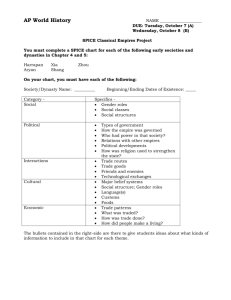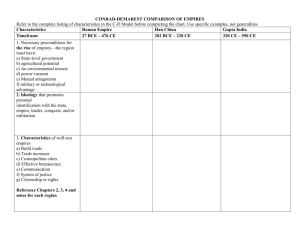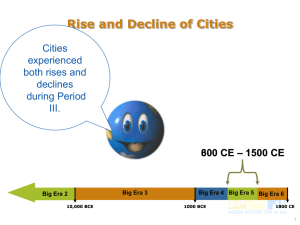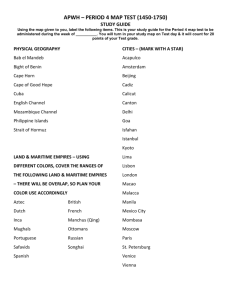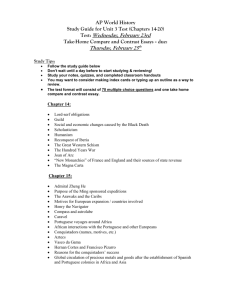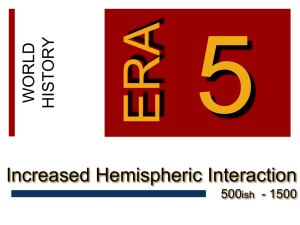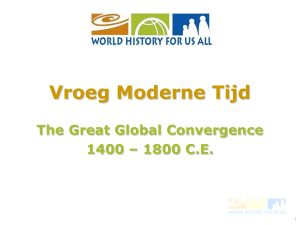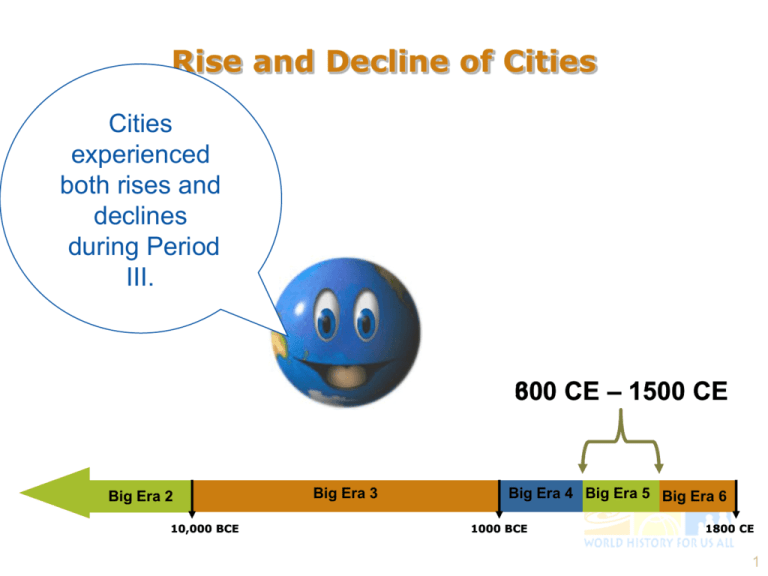
Rise and Decline of Cities
Cities
experienced
both rises and
declines
during Period
III.
300 CE – 1500 CE
600
Big Era 2
10,000 BCE
Big Era 3
Big Era 4 Big Era 5 Big Era 6
1000 BCE
1800 CE
1
The Rise and Decline of
Cities
The effects of trade and
productivity on cities from
600-1450 CE
2
Microsoft®Encarta®Reference Library 2002. ©1993-2001 Microsoft Corporation. All rights reserved.
Between 600-1450 CE, many connections
were established among regions. These
formed interregional patterns of unity.
3
Important Factors
• 5 Main Factors
– Population
Growth/Migration
– The Rise and Fall of
States and Empires
– Trade Networks
– The Spread of Ideas
and Beliefs
– Diffusion of Crops
and Technologies
4
World
population
grew from
about
250 million to
460 million
between
200 CE
and 1500 CE.
Sometimes interregional exchanges
allowed disease to spread, as well as
more helpful things.
Bubonic Plague
5
Population Growth and
Migration
• Effects of a growing
population
– Growing population
strained the
environment
• Deforestation, soil
erosion, floods and
famines
– Diseases spread in
heavily populated areas
(along trade routes)
– Cities who experienced
these issues began to
decline
• What did people do?
– Migrate to escape
floundering cities
• Took food, animals,
and ideas to new home
• Pushed out existing
residents and forced
them to migrate
elsewhere
• New farming and
military technology
were spread as well
• Introduced new
languages, arts and
cultures to new regions
6
Vikings
Mongols
Germanic
Tribes
Turkic
Groups
Chinese
Arabs
Bantu-Speaking
People of Africa
People of
Oceania
People migrated to new
places in (and out) of
Afroeurasia.
7
States and Empires
• The Fall of Classical
Empires
– Creates instability
and the decline of
major cities
• New Empires Emerge
– Stability improves
trade and
commerce
– Trade=Cities Grow
– Built on the
framework of
previous empires
8
States and Empires (Cont.)
• Contribution to the Rise of
Cities
– Wars=Destruction, but
also new inventions
– Strong gov’t=Stability=
Trade Increase
– Patrons of science, art,
and religion
– Facilitated interactions
of people from various
backgrounds
9
Frankish
Kingdoms
Avar Kingdom
Parhae
Byzantine Empire
Sassanid
Empire
Sui China
Silla
Yamoto
Japan
Harsha’ Empire
Chalukya
Ghana
Axum
States and Empires in 600 CE
10
Carolingian
Parhae
Byzantine
Cordoba
Caliphate
Abbasid
Caliphate
GurjaraPratihara
Tang China
Silla
Heian
Japan
Ghana
Axum
Dar-al Islam
Srivijaya
States and Empires in 800 CE
11
Scandanavian
Kingdoms
Russia
THE EXCEPTION!!!!!!!!
England
France
Spain
H.R.E.
Poland
Mongol Empire
Hungary
Rum
Portugal Almohad
Caliphate Ayyubid
Caliphate
Koryo
Delhi
Sultanate
Sung
China
Kamakura
Japan
Mali
Ethiopia
Oyo
Angkor
Benin
Zimbabwe
States and Empires in 1237 CE
12
Union of Kalmar
Russian
States
Scotland
England
France
Portugal
PolandKhanate of the
Holy
Lithuania Golden Horde
Roman
Empire Hungary
Castile
Jagatai
Khanate
Ottoman Emp.
Timurid Empire
Granada
Marinids Hafsids
Korea
Ming
China
Ashikaga
Japan
Mamluk
Sultanate
Mali
Oyo Benin
Ethiopia
Vijayanagara
Zanj City-States
Siam
Majapahit
Zimbabwe
States and Empires in 1400 CE
13
Trade Networks
• Trade Networks
Grow=Cities Grow Along
Trade Routes
– Stimulates use of
natural resources
– Spread religion, art,
science, and tech
– Manufacturing grows
(jobs)
– Bank, credit, and
money systems
facilitate long distance
trade
• Trade Networks Create
Demand
– Cities provide new
markets for consumer
goods
– Increased population
creates needs
– New foods can
supplement higher
populations
– Merchants see
opportunity in urban
areas
14
Hanseatic
League
Silk Road
Trans-Saharan
IOMS
From 600-1500 CE, trade routes extended
farther and were used by more travelers.
15
Spread of Ideas and Beliefs
• Cultural Exchange
– Trade increases
interaction, interaction
causes ideas to be
exchanged
• Unity
– Common belief systems
– Religious and cultural
centers emerge
• Conflict
– New and old beliefs and
cultures create conflict
which can devastate
cities
16
Transport and communication
technologies improved.
Sternrudder
Lateen sail
Books & paper
North Arabian
camel saddle
Stirrup
Mapmakin
g
Astrolabe
17
Water & energy technologies were
transferred across Afroeurasia.
• Hydraulic systems
carried water where
expanding cities
needed it.
• Wheels lifted water
to irrigate crops and
drain swamps.
• Waterwheels,
windmills, and triphammers provided
energy for pumping,
grinding, milling, and
pounding.
18
• Citrus fruits rolled from
Southwest Asia to Spain,
celebrated in garden and
song.
• Cane sugar sweetened a
path from India to the
Mediterranean.
• Cotton wove its way from
India to North Africa,
Central Asia, and China.
19
• The pace of innovation
increased.
• Knowledge
accumulated more
quickly.
• Manufacturing and
farming productivity
increased.
• People’s diets and
health improved.
• Sea travel and
transport webs became
thicker.
How did transfers of
technology and
products allow cities to
grow?
20


